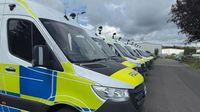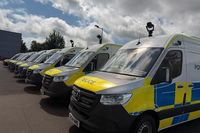On August 13, 2025, the UK government unveiled a significant expansion in the use of live facial recognition (LFR) technology by police forces across England. Ten new vans equipped with advanced facial recognition cameras are set to be deployed among seven police forces: Greater Manchester, West Yorkshire, Bedfordshire, Surrey, Sussex, Thames Valley, and Hampshire. This move, which effectively doubles the number of such vehicles on the roads, is part of a wider government effort to modernize policing, target high-harm offenders, and rebuild public confidence in neighborhood safety.
According to the Home Office, the LFR vans will be used to catch suspects wanted for serious crimes, including sexual offences, violent assaults, and homicides. The technology works by scanning the faces of passersby and comparing the data to a watchlist of wanted individuals, using precise measurements of facial features such as the distance between the eyes and the length of the jawline. Each van will be staffed by a trained officer, who will personally verify every match identified by the system before any action is taken.
The Home Office pointed to the technology’s proven track record in London, where it has been credited with 580 arrests in just 12 months. Among those apprehended were 52 registered sex offenders who had breached their conditions. The Metropolitan Police, as reported by BBC, highlighted that these arrests included suspects for rape, domestic violence, and knife crime. In July 2025, the Met stated that a total of 1,035 arrests had been made since the technology’s introduction, including the dramatic case of a paedophile found with a six-year-old girl.
Live facial recognition first made its UK debut in 2017 during the UEFA Champions League final in Cardiff. Since then, its use has been largely confined to South Wales, London, and Essex, including high-profile deployments at events like Beyoncé concerts to scan for paedophiles and terrorists. The first permanent LFR cameras were installed in Croydon earlier this year, marking a new phase in the technology’s integration into British policing.
Despite these successes, the expansion has sparked a fierce debate over privacy, civil liberties, and the potential for misuse. Human rights groups such as Big Brother Watch and Amnesty International UK have voiced strong opposition. Rebecca Vincent, interim director of Big Brother Watch, told BBC: “Police have interpreted the absence of any legislative basis authorising the use of this intrusive technology as carte blanche to continue to roll it out unfettered, despite the fact that a crucial judicial review on the matter is pending. The Home Office must scrap its plans to roll out further live facial recognition capacity until robust legislative safeguards are established.”
Amnesty International UK’s racial justice lead, Alba Kapoor, echoed these concerns, stating: “It has been known to lead to misidentification and the risk of wrongful arrest, and it's also known to be less accurate in scanning the faces of people of colour.” Amnesty called for the immediate scrapping of the plans, labeling the technology “dangerous and discriminatory.” The civil liberties charity Liberty welcomed the government’s decision to consult on a statutory framework, but insisted this legal foundation should precede any further rollout: “There's no reasonable excuse to be putting even more cameras on our streets before the public have had their say and legislation is brought in to protect all of us.”
Labour peer and former Liberty director Baroness Chakrabarti described the technology as “incredibly intrusive,” warning of a potential slide towards a “total surveillance society.” She raised alarms about the implications for privacy, freedom of assembly, and the risk of false matches, telling BBC that the technology had so far been deployed “completely outside the law,” with police “making up their own rules and marking their own homework.”
In response, Home Office Minister Diana Johnson rejected claims that the UK is becoming a surveillance state. She emphasized that signposting will make it clear to the public when LFR is in operation, and that information will only be retained for the duration of each deployment. Johnson described facial recognition as “a powerful tool for policing” that would be used “in a very measured, proportionate way” to locate individuals suspected of serious offences. She also noted that a public conversation was needed about how the technology should be used, and that the government was actively consulting on this issue. The government has committed to drawing up a new legal framework following the consultation, aiming to “ensure transparency and public confidence.”
The Home Office has stressed that LFR vans will only be deployed in response to specific intelligence, and that watchlists will be tailored for each operation according to guidelines set by the College of Policing. The National Physical Laboratory, which independently tested the facial recognition algorithm, found it to be accurate and reported “no bias for ethnicity, age, or gender” at the settings used by police. Chief Superintendent Tim Morgan of South Wales Police, who is coordinating the rollout, said: “We understand the concerns which are raised about the use of live facial recognition technology and we use any new technology ethically and spend time and effort making sure it’s deployed in line with all legislation and guidance. It is important to remember that use of this has never resulted in a wrongful arrest in South Wales and there have been no false alerts for several years as the technology and our understanding has evolved.”
Lindsey Chiswick, the National Police Chiefs’ Council lead for facial recognition, described the expansion as “an excellent opportunity for policing,” asserting that it will help officers find suspects “quickly and accurately.” She added, “I am confident that the increased use of this technology will continue to support the safety of communities across the country moving forward.” The Police Federation of England and Wales, representing rank-and-file officers, urged the government to invest in comprehensive training programs, especially as police forces face an unprecedented officer retention crisis.
The rollout of LFR vans is part of a broader overhaul of neighborhood policing. The Home Office also announced it has fulfilled a manifesto pledge by ensuring every community in England and Wales now has a named, contactable police officer. Residents can find their local officer’s details on their police force’s website, with a commitment to respond to queries within 72 hours. Home Secretary Yvette Cooper said: “Neighbourhood policing has been decimated over the last 15 years, but through our Plan for Change we are turning the corner, starting with town and city centres. Within the next year, we will have 3,000 new neighbourhood officers and PCSOs in place, which is a big shift.”
As the government moves forward with its Plan for Change, the expansion of live facial recognition technology stands at the crossroads of public safety and personal privacy. With legal challenges pending and a national consultation underway, the coming months will be crucial in determining how this powerful tool is governed—and how it will shape the future of policing in the UK.



